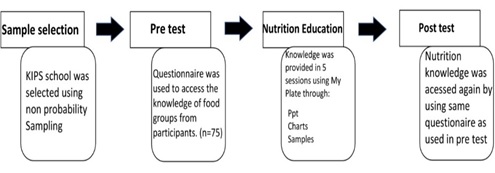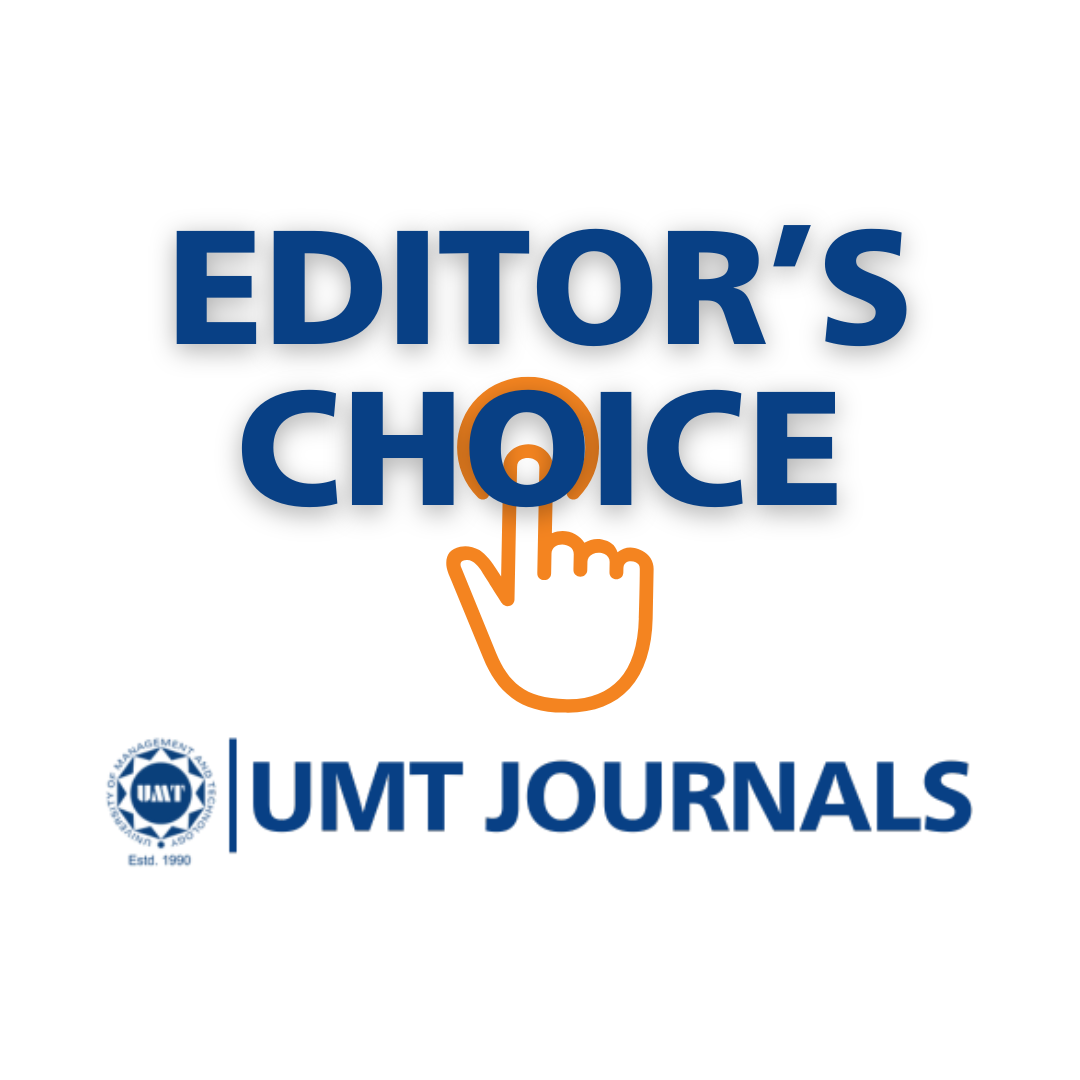Impact of My Plate-Based Education on Nutrition Knowledge of Elementary School Students in Lahore, Pakistan
Abstract
 Abstract Views: 0
Abstract Views: 0
An interventional study was conducted to enhance the knowledge of school going children of seventh grade. School age is the best age to provide nutrition knowledge because at this age eating habits are being developed. Nutrition education is an approachable and effective tool for healthy living. Nutrition knowledge helps students to become aware of healthy choices and also helps to prevent the onset of different diseases. ‘My Plate’ is a tool that is used to provide knowledge to students. Every food group on My Plate has equal importance and health benefits. In this research, a self-made questionnaire was used and the knowledge of students about food groups was assessed using SPSS. The results indicated a major difference between pre-test and post-test knowledge. In introduction, knowledge student’s knowledge increased from 4% to 76.7%. Regarding grains, group knowledge increased from 25.3% to 72.6%. Regarding fruits and vegetables and proteins, student knowledge increased up to 97.3% and 90.4%, respectively. Regarding dairy products, group knowledge increased up to 84.9%.
Downloads
References
Perera T, Frei S, Frei B, Wong SS, Bobe G. Improving nutrition education in U.S. elementary schools: challenges and opportunities. J Educ Pract. 2015;6(30):41–50.
Dhandevi PEM, Jeewon R. Fruit and vegetable intake: Benefits and progress of nutrition education interventions-narrative review article. Iran J Public Health. 2015;44(10):1309–1321.
Octaviani RE, Sabilu Y. Education on the fulfillment of balanced nutrition and my plate contents for students of SMPN 7 Kendari. Indo J Innov Appl Sci. 2021;1(1):40–43. https://doi.org/10.47540/ijias.v1i1.159
Kostanjevec S, Jerman J, Koch V. The effects of nutrition education on 6th graders knowledge of nutrition in nine-year primary schools in Slovenia. Eurasia J Math Sci Technol Educ. 2011;7(4):243–252. https://doi.org/10.12973/ejmste/75208
Jung T, Huang J, Eagan L, Oldenburg D. Influence of school-based nutrition education program on healthy eating literacy and healthy food choice among primary school children. Int J Health Promot Educ. 2019;57(2):67–81. https://doi.org/10.1080/14635240.2018.1552177
Metzler BL, Yen AC, Haroldson AR, Friesen CA. An evaluation of discover MyPlate: an inquiry-based nutrition education curriculum for kindergarten students. J Nutr Health Food Sci. 2017;5(1):1–6.
Anderson AS, Porteous LE, Foster E, et al. The impact of a school-based nutrition education intervention on dietary intake and cognitive and attitudinal variables relating to fruits and vegetables. Public Health Nutr. 2005;8(6):650–656. https://doi.org/10.1079/PHN2004721
Pérez-Rodrigo C, Aranceta J. School-based nutrition education: lessons learned and new perspectives. Public Health Nutr. 2001;4(1a):131–139. https://doi.org/10.1079/PHN2000108
Gresser MR. The Consumption of Dairy and Dairy Alternatives and the Perception of Dairy in College Students [master's thesis]. Kent State University; 2015. http://rave.ohiolink. edu/etdc/view?acc_num=kent1428574455

Copyright (c) 2023 Zahra Abbas , Aiman Jamil , Syeda Laraib Ayaz , Ifza Ikhlaq , Madiha Noor , Afifa Tanweer

This work is licensed under a Creative Commons Attribution 4.0 International License.
BSR follows an open-access publishing policy and full text of all published articles is available free, immediately upon publication of an issue. The journal’s contents are published and distributed under the terms of the Creative Commons Attribution 4.0 International (CC-BY 4.0) license. Thus, the work submitted to the journal implies that it is original, unpublished work of the authors (neither published previously nor accepted/under consideration for publication elsewhere). On acceptance of a manuscript for publication, a corresponding author on the behalf of all co-authors of the manuscript will sign and submit a completed the Copyright and Author Consent Form.










